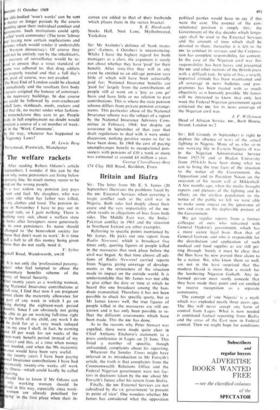The welfare rackets
After reading Robert Odams's article )eptember), I wonder if this can be the wn why some pensioners are living below poverty line. So much money seems to be ed on the wrong people.
s a war widow my pension just pays rent and fuel. My daughter, who was )ears old when her father was killed,
s my clothes and food. The pension in- se in November I have to pay out in eased rent, so I gain nothing. There is cthing very sick about a welfare state
t looks after foreigners more generously its own pensioners. Its name should changed to 'the benevolent society for those that don't want to work'. It is time all a halt to all this money being given hose that do not really need it.
V. Syltes
gstaff Road, Wandsworth, sw18 It is not only the 'professional poverty- ders' who feel tempted to abuse the lementary benefits scheme of the istry of Social Security.
her twenty years as a working woman, ng National Insurance contributions at full rate, I find that now I am pregnant nnot claim the maternity allowance for part of any week in which I go on king during the eighteen-week period enefit. Since I am obviously not going e able to go on working full-time right o the birth of my child, any work I do be paid for at a very much reduced (in my case I shall, in fact, be earning lid £8 per week for ten weeks of the een-week benefit period instead of my salary) and this, at a time when money ost needed, and when the 90s maternity ance would have been very useful. the twenty years I have been paying onal Insurance contributions I have had )ximately twenty-one weeks off work to illness—which could hardly be called ngering, Should like to know if Mr Odams can • why working women should be lised in this way, especially since work- women are already penalised for ing' in the first place when their in- comes are added to that of their husbands which places them in the surtax bracket.
S. E. Hardeastle
Stocks Hall, Nest Lane, Mytholmroyd, Yorkshire Sir: Mr Assinder's defence of 'bank mana- gers' (Letters, 4 October) is unconvincing. Whilst I have the highest regard for bank managers as a class, the argument is surely not about whether they have 'paid' for their benefit. After sixty-five they will in any event be entitled to an old-age pension very little of which will have been actuarially paid for; National Insurance benefits are 'paid for' largely from the contributions of people still at work on a 'pay as you go' basis and have little or no relation to past contributions. This is where the state pension scheme differs from private pension arrange- ments. This particular abuse of the National Insurance scheme was the subject of a report by the National Insurance Advisory Com- mittee in February 1968; but despite an assurance in September of that year that draft regulations to deal with it were under discussion, nothing positive seems so far to have been done. In 1968 the cost of paying unemployment benefit to occupational pen- sioners with pensions of £10 a week or more was estimated at around £4 million a year.
George Chowdharay-Best 174 Clay Hill Road, Basildon, Essex










































 Previous page
Previous page